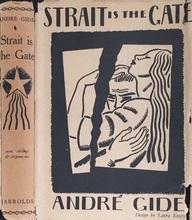 Straight Is the Gate by André Gide
Straight Is the Gate by André Gide
My rating: 4 of 5 stars
It so often happens that I read 19th Century fiction and marvel at how much better the writers of the day were at controlling the mechanics of their craft. Characters are richer, the vocabulary is wielded with greater ease and the plots flow with the confidence of certain conclusion. Is it the Great Filter of History in action? Or is it simply that our ancestors spent more time reading and writing than we do, therefore became better at it?
Whatever the reason, Andre Gide’s “Straight is the Gate”, a masterful novella, is further evidence that older is sometimes better. Even in translation, it easily surpasses most, if not all, of the digitally processed fast food that streams across the cyberbookshops of the digital age. And as is often the case, it does so without the aid of gimmickry: no bodies on page two, and a simplicity of narrative style (first person, referencing the letters of a second person) at which most modern writers would balk – I am including myself here.
The story is nonetheless interesting, in the very complexity of its eventlessness. A young couple, in love, yet unable to come together as a result of twisted piety and self-imposed restraint; one which belies a deeper psychological illness. I have often reflected how the current state of COVID-hysteria has a religious dimension to it, and in reading ‘Straight is the Gate’, I found eerie parallels. The female protagonist, Alissa, uses her religion as a cloak for her mental illness, in the same way our mentally ill society is using COVID as an excuse to collapse into itself.
Great novels may yet be written about our time, which explore a similar theme – how COVID is being used by the mask-wearing masses to shield themselves against the emotional void created by this godless, consumerist society in which they feel so lost. I just hope that, buried in the ashheap of digital junkies, there are enough real writers out there with the craft to do such a theme justice.


